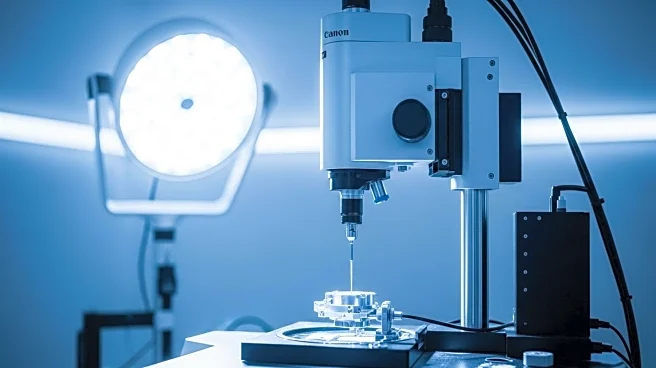What's Happening?
The Artificially Intelligent Laboratory Assistant (AILA) framework has been developed to automate atomic force microscopy (AFM) operations, utilizing large language model agents to streamline experimental processes. AILA's architecture is designed for modular integration with various experimental platforms, featuring a planner that coordinates user interactions and specialized agents. The AFM Handler Agent controls experimental procedures, while the Data Handler Agent manages image optimization and analysis. AILA's dynamic routing system allows for efficient task completion, leveraging Python-based APIs for real-time control of AFM instruments. The framework has been tested with AFMBench, a set of 100 experimental tasks, demonstrating its ability to handle complex workflows and integrate multiple tools and agents.
Why It's Important?
The automation of AFM operations through AILA represents a significant advancement in scientific research, potentially reducing the need for expert intervention in complex experimental setups. This could lead to increased efficiency and reproducibility in scientific analyses, benefiting industries reliant on precise material characterization, such as nanotechnology and materials science. By minimizing human error and optimizing experimental parameters, AILA could enhance the quality of data obtained from AFM experiments, facilitating breakthroughs in research and development. The framework's ability to handle complex tasks autonomously may also accelerate the pace of innovation in laboratories, offering a competitive edge to organizations that adopt this technology.
What's Next?
Future developments for AILA may include expanding its capabilities to other types of scientific instruments and refining its error-handling protocols to further improve operational efficiency. The framework's success in automating AFM tasks suggests potential applications in other areas of laboratory automation, such as chemical synthesis and biological assays. Researchers and developers may focus on enhancing AILA's safety protocols and integrating human-in-the-loop mechanisms to ensure robust performance in sensitive experimental environments. As AILA continues to evolve, it may become a cornerstone technology in the push towards fully autonomous laboratories.
Beyond the Headlines
The implementation of AILA raises important ethical and safety considerations, particularly in terms of AI's role in scientific experimentation. Ensuring that AI systems adhere to strict operational guidelines is crucial to prevent unintended consequences in laboratory settings. The framework's ability to autonomously generate experimental protocols highlights the need for comprehensive safety measures to protect both equipment and data integrity. As AI becomes more integrated into scientific research, discussions around the ethical implications of machine-driven experimentation will likely intensify, prompting the development of industry standards and regulatory frameworks.











